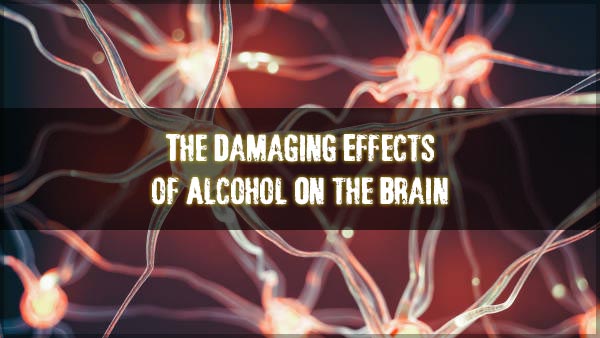Alcohol is the most commonly misused substance in America. In fact, 52% of people in America age 12 and over regularly consume alcohol.
While you may not consider alcohol as a drug, the effects of alcohol on the brain tell a different story. Alcohol changes the connections in the brain just like any other drug. And, just like any other drug, these changes can become permanent if left unchecked.
What does alcohol do to your brain? Let’s explore the damaging effects of alcohol on the brain.
The Effects of Alcohol on the Brain
How alcohol affects the brain is going to depend, in some part, on how much alcohol you consume on a regular basis. An occasional drink is not going to cause the same issues that occur with heavy drinkers or even binge drinkers.Â
There are also short-term and long-term effects on the brain with alcohol consumption. While the short-term effects will wear off once the alcohol leaves your system, the long-term effects are harder to correct.
Short-Term Alcohol Effects on the Brain
The short-term effects are the issues seen during intoxication. These effects usually wear off once the alcohol leaves your system. With continued use though, some of these issues become harder to overcome.
Poor Decision-Making
When you become intoxicated with alcohol use, you will usually see a decrease in inhibitions. It becomes more difficult to make good decisions as your brain is clouded from the chemical imbalance created by alcohol use.
It’s during these times of intoxication that you’re more likely to participate in risky behavior. This risky behavior can include driving under the influence, getting into fights, or even risky sexual encounters.Â
Increase Mental Health Issues
Because alcohol affects the neurotransmitters and chemical connections in the brain, other underlying mental health issues are affected by alcohol consumption. Issues such as depression, anxiety, PTSD, etc. can be increased with intoxication.
While alcohol seems to provide a temporary relief to some of these issues, the breakdown in the brain can actually increase these mental health issues. This becomes more obvious as the symptoms of intoxication wear off.
With continued alcohol abuse, it requires more alcohol to get the same “relief” experienced early on. This continued use will increase the mental health symptoms each time the alcohol leaves your system. As alcohol use continues, changes to the brain can also make the issues worse, or lead to further mental health issues.
Concentration and Memory Issues
Another short-term effect of alcohol is concentration and memory issues. The brain fog associated with intoxication makes it difficult to focus on necessary tasks or conversations.Â
You may also forget what you were doing or where you’ve put things as you become drunk. While these effects will likely wear off once the alcohol leaves your system, these concentration and memory issues can become more permanent if alcohol abuse continues.
Long-Term Alcohol Effects on the Brain
As alcohol abuse continues, your ability to function in daily life can decrease. As stated, memory loss can increase with prolonged use. This can transfer into periods of sobriety, making it difficult to remember things even when not drinking.
Decrease in Short-Term Memory
With continued alcohol use, the ability to remember recent events, conversations, or tasks can decrease. The longer you abuse alcohol, the harder it is to reverse these memory issues.Â
Blackouts
As you continue to drink, the amount you need to get the desired results will increase. This is due to the changes to receptors in the brain. The more you drink, the more likely you are to get alcohol poisoning.
One effect of alcohol poisoning is blackouts or complete memory loss. You may find you can’t remember events from the night before, or you may wake up unsure how you got where you are. These are signs of blackouts.Â
While you may regain your memory after a blackout, it’s more likely that these periods will continue as lost time. The longer you drink, the more likely these blackouts will occur, and the more severe they become.
Decreased Size and Function of the Brain
Alcohol consumption can actually shrink your brain over time. This brain shrinkage doesn’t just change the size of your brain though. As you lose brain matter, you also lose brain function.
Left to itself, this brain damage can become permanent. This means you will lose the ability to perform abstract thinking or perception over time.Â
While it’s possible to reverse these effects if you stop drinking, it becomes harder to reverse the longer this damage goes on. This is why it’s important to get help as soon as possible if you or a loved one are dealing with an alcohol abuse problem.
Thiamine Deficiency
Thiamine deficiency may not sound like a serious problem, but it can lead to serious long-term issues. Thiamine is one of the B vitamins, and it’s essential in the breakdown of carbohydrates in the body.
Studies show that 80% of alcoholics have a thiamine deficiency. Not only can this deficiency cause health problems, such as decreased heart function, it can also cause serious brain and nerve damage.
A thiamine deficiency can lead to a disease known as Wernicke-Korsakoff Syndrome (WKS). This disease leads to damage to the nerves that control eye movement and other nerves that can cause poor coordination. WKS can also cause permanent learning and memory problems over time.Â
Reversing the Effects of Alcohol on the Brain
While some of the effects of alcohol on the brain may prove irreversible, other effects can improve over time. With the right treatment, brain matter can be regulated, and possibly increased, mental health issues can be balanced, and memory issues can be reversed.
It’s important to start out with the right treatment. It’s also important to be patient. The alcohol brain damage has generally occurred over a long period of alcohol consumption, and the brain will need time to overcome these issues.
The first step to reverse some of these effects is to get professional treatment. If you’re ready to take that first step, check out your treatment options.





